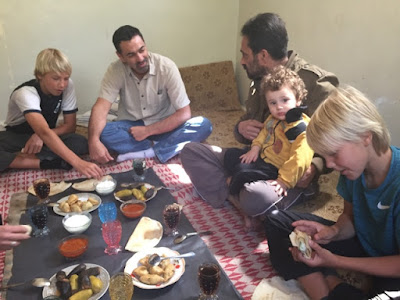The urban refuges are Syrians living in the city in normal type of homes which they rent. In order to do so, they must spend any savings that they have because Jordan does not allow them work. We were able to visit and hear their stories and share a meal with them, getting a true sense of the world renowned Arab Hospitality - which we are starting to think means, feed the guests until they burst. One thing to note is that the men and women eat completely separately so Mom and SJ did not see Dad and the boys all day. During the boys first visit, the girls were participating in a club of sorts where local women come together to create items and share their lives with one another.
We cannot begin to convey the heartache and trauma that these people have endured since 2011, so we are not going to try to retell their stories for fear that they get underscored.
Here is a summary from our translated conversations with two families:
- Syrians are profoundly proud of their country and heritage. You could feel it as they speak.
- One man wants to return to Syria so badly that he would be happy just to sleep in a tent on Syrian soil.
- Over 90% of the country has left
- These are normal working families, just like any in America, trying to raise and educate their children.
- The crimes committed by the Bashar al-Assad regime are far worse than anything we have seen in the media.
- Children and people of all ages are being murdered and these people have seen it first hand. The government started killing innocents as a threat with the hope to stop the revolution, but it only had the opposite effect because people thought, "If I'm going to be killed anyway, I might as well do something." This forced people into the streets that normally would not be involved in such matters to become a part of it.
- Many people (some of our hosts' relatives) are still trapped in the country, under constant watch, and would be shot for attempting to leave. We were told that many of these "wish they were dead because what they have is not life."
- There is no food and the government purposely brings into towns quantities that are not enough, in order to cause division between those desiring to feed their children.
- The rebels have a dedicated channel which highlights their campaign.
- The refugees commented on the incident where someone threw a shoe at President Bush years ago, but said they cannot even make a remark against a soldier without serious repercussions.
- There is very little hope left as people's entire psyches have changed. Even if the rebels win, "revenge killings will occur for a long time."
- Women don't really share their stories and feelings because they have to survive. They feel selfish sharing that they are grieving because they know the people around them are going through their own loss.
- Even though some of these people left Syria years ago, their trauma is fresh and current because maybe they don't know where certain family members are, the news is constantly bombarding them, and their circumstances prevent them from moving forward with healing and hope.
- Refugees have to be sponsored by a Jordanian to live outside of the camp. It took one of the families we met with two years to get sponsored.
- The more educated a Syrian, the less likely they can work in Jordan, which prevents them from working unless they find a "sponsor," which more or less makes them that person's indentured servant. If anything were to go south with that relationship the refuge would be sent back to the camp.
- The young children in the refugee families are what give those who have lived through this hell a reason to hope, smile, and keep their minds off of the past.
- The refugees want to work, but are not allowed, and that is one of the biggest issues with the Jordanian situation at this time. They are stuck, they come from generations of hard workers and not having a job does not sit well with them.



it must have been so heartbreaking to hear these people's stories. God bless you for reaching out to them and may God have mercy on them.
ReplyDelete